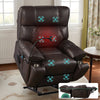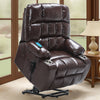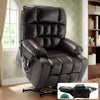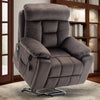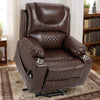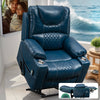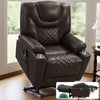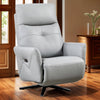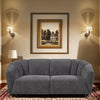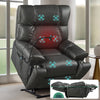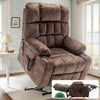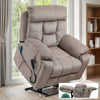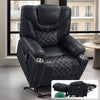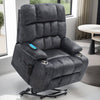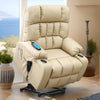Understanding Medicare Coverage for Lift Chairs
What Medicare Covers in a Lift Chair
Medicare helps pay for part of a lift chair. It covers the seat lift mechanism only. This is the part that helps you stand up. Medicare doesn't pay for the whole chair. The lift mechanism must be ordered by your doctor. It has to be medically necessary. Medicare Part B covers it as durable medical equipment. You need to have certain health issues to qualify. These often include severe arthritis or mobility problems. The lift mechanism is seen as a tool to help you move around at home.

How to Qualify for Medicare Coverage
To get Medicare to pay, you must meet specific health rules. Your doctor must say you need the chair. You should have bad arthritis in your hip or knee. Or you might have a serious muscle disease. You must not be able to stand up from a regular chair. The lift chair should be part of your treatment plan. You should be able to walk once you're standing. The chair should help you get better or stop you from getting worse. Your doctor needs to fill out a form called a Certificate of Medical Necessity.
The Types of Lift Chairs Covered by Medicare
Features Covered by Medicare
Medicare only pays for the lift mechanism, not the whole chair. This mechanism helps you stand up and sit down safely. It must be a separate unit that can be removed easily. The motor and lifting device are included. The controls that make the chair lift are also covered. Medicare doesn't pay for heat, massage, or other comfort features. You have to pay for the chair itself, including the cushions and fabric. These parts are not covered by Medicare. The lift mechanism is the only part that Medicare will help pay for.
Examples of Medicare-Approved Lift Chairs
Many brands make lift chairs that Medicare approves. Pride Mobility is a popular choice. Their chairs often meet Medicare's rules. Golden Technologies is another good brand. They make chairs with removable lift parts. Mega Motion chairs are also often approved. These brands offer different styles and sizes. Some chairs can recline in two or three positions. Others can move into any position. Remember, Medicare only covers the lift part. The chair's other features don't matter for Medicare approval.
Navigating the Medicare Process for a Lift Chair
Steps to Obtain Medicare Coverage for Lift Chairs
First, talk to your doctor about needing a lift chair. They'll check if you meet Medicare's rules. If you do, they'll write a prescription and fill out forms. Next, find a supplier that Medicare approves. They'll help you pick a good chair. The supplier will send a claim to Medicare. You might need to pay first and get paid back later. Keep all your receipts and papers. Check with Medicare if you don't hear about your claim. Be ready to answer questions about why you need the chair.
Documentation and Physician Approval
Good paperwork is key for Medicare to say yes. Your doctor must fill out a Certificate of Medical Necessity. This form explains why you need a lift chair. It should say why you can't use a cane or walker instead. Your doctor might need to share your health history. This shows you've had mobility issues for a while. The supplier will need a copy of your prescription. They'll also ask for the doctor's notes and Medicare forms. Keep copies of all papers for yourself. This helps if there are any problems with your claim.
Costs and Reimbursements
The Cost of Lift Chairs Without Medicare
Lift chairs can be expensive if Medicare doesn't help. Basic chairs start at about $600 to $800. Fancier chairs can cost $2,000 or more. Prices change based on features and quality. Chairs with heat and massage cost more. So do chairs with more position options. The brand also affects the price. Some very nice chairs can cost $3,000 or more. Remember, these prices are for the whole chair. Medicare only covers the lift part. This is usually about 20% of the chair's total cost.

What to Expect from Medicare Reimbursement
Medicare usually pays 80% of the approved amount for the lift part. You pay the other 20%. The approved amount is often less than the real cost. For example, if the lift part costs $300, Medicare might approve $250. They would then pay 80% of $250, which is $200. You'd pay the remaining $100. This includes your 20% of the approved amount, plus the extra. You have to pay for the chair itself. It can take weeks to get paid back. You might need to pay everything first and wait for Medicare to pay you back.
Alternative Financing for Lift Chairs
Other Insurance Options
Some private insurance plans might cover lift chairs. Check your policy or call your insurance company. Medicaid sometimes pays for lift chairs for people with low incomes. Each state has different rules for Medicaid coverage. Long-term care insurance might help pay for a lift chair. Veterans may get help through the VA. Some Medicare Advantage plans offer extra coverage for home medical equipment. These plans might pay for more of the chair's cost. Always check with your insurance to see what they cover.
Programs and Grants for the Elderly
Local aging agencies might offer money help for lift chairs. Some non-profit groups give grants for medical equipment. The Alzheimer's Association has a program that might help. State technology programs can sometimes provide funding. Some charities focus on helping older adults stay at home. They might offer grants or cheap loans. Check with local senior centers for information on programs. Churches and community groups may also have ways to help.
Choosing the Right Lift Chair
Essential Features in Lift Chairs for the Elderly
Look for a chair that lifts smoothly and steadily. The controls should be easy to use, even with sore hands. Choose a chair that fits your size and weight. Good back support is very important for comfort. Some chairs offer extra support for your head and neck. Think about the fabric - it should last long and be easy to clean. Look for a chair with a backup battery in case the power goes out. Some chairs have pockets to keep things close by. Think about whether you need heat or massage. Remember, Medicare won't pay for these extra comforts.
How to Select a Lift Chair for Medicare Reimbursement
Choose a chair with a lift part that Medicare approves. Make sure the lift part can be easily taken off the chair. Ask the supplier for chairs that follow Medicare's rules. Think about your specific health needs when picking features. Don't pay extra for things you won't use or need. Check that the chair can hold your weight. Make sure the chair fits well in your room. Compare prices from different Medicare-approved sellers. Remember, you'll pay for most of the chair yourself. Balance your budget with your comfort and health needs.
Tips on Maintaining and Servicing a Medicare-Funded Lift Chair
Maintenance Advice for Longevity
Clean the chair regularly as the maker suggests. Check and tighten any loose screws or bolts each month. Keep the lift part free from dust and dirt. Try not to eat in the chair to avoid spills and stains. Use a surge protector to protect against electrical damage. Don't go over the chair's weight limit to protect the lift part. Turn cushions over regularly to wear them evenly. Keep pets away to avoid damage to the fabric. Follow the manual's rules for oiling moving parts. Keep the user manual in a safe place for future use.

Dealing with Repairs and Servicing
Call the supplier or maker for any mechanical problems. Some repairs might be covered by warranty. Medicare may help pay for fixing the lift part. Keep all receipts and papers for repairs. Regular check-ups can prevent big breakdowns. Some companies offer maintenance plans for an extra fee. Learn how to fix small problems yourself. Know when it's time to call a professional for help. Ask about temporary chairs if yours needs big repairs. Think about the cost of repairs versus buying a new chair.
Common Questions About Medicare and Lift Chairs
Preapproval and Claims Process
Medicare doesn't require preapproval for lift chairs. But getting pre-approval can help. It makes sure you qualify before you buy. The claims process starts after you buy the chair. Your supplier usually sends the claim to Medicare. You may need to send it yourself in some cases. Claims can take several weeks to process. Medicare may ask for more information during this time. Keep all your paperwork organized and easy to find. Follow up if you haven't heard about your claim. Be ready to appeal if Medicare says no to your claim.
Adjusting and Upgrading Chairs with Medicare
Medicare may cover changes to the lift part if they're medically needed. Upgrades to other parts of the chair aren't covered. You'll pay for comfort feature upgrades yourself. If your needs change, you might qualify for a new lift part. This usually needs a new prescription and paperwork. Medicare typically won't pay for a whole new chair. They may help if the original lift part breaks beyond repair. Always check with Medicare before making any changes. Understand what's covered to avoid surprise costs.








